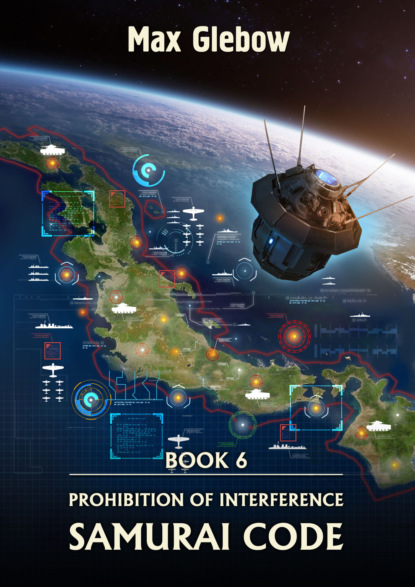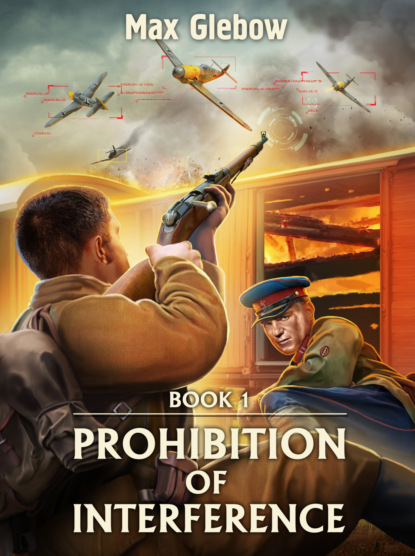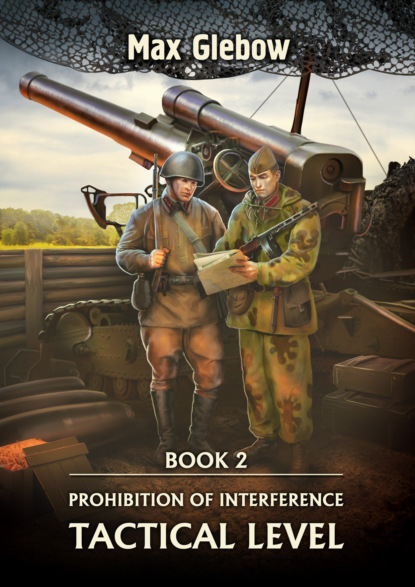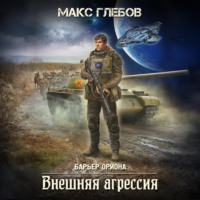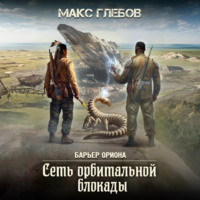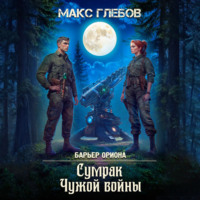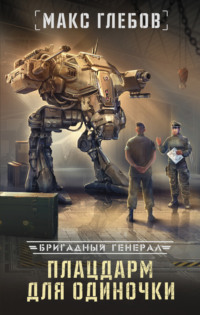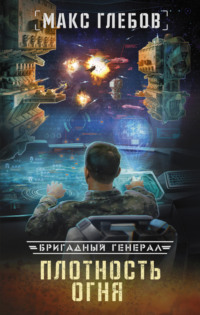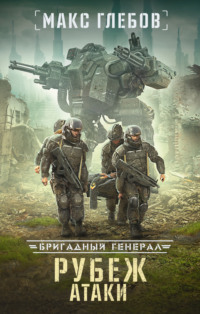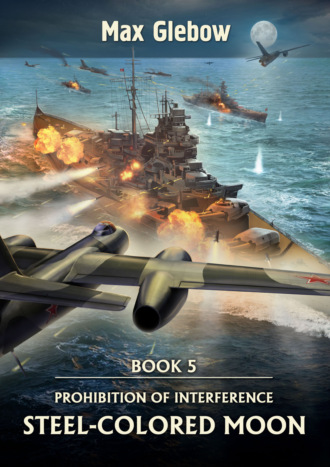
Полная версия
Prohibition of Interference. Book 5. Steel-colored Moon
“This is really an important question, Comrade Zhigarev,” Stalin said slowly at last, “and we will come back to it later, but right now the Headquarters of the Supreme High Command is not interested in Major General Nagulin's knowledge of the Air Force's affairs, but in your opinion about the feasibility of his proposals. Your honest and objective opinion.”
* * *Like most German generals, Wolfram von Richthofen was not optimistic about events on the Eastern Front. Only a month ago he had been appointed commander of the 4th Air Fleet that supported Army Group South, but to his own surprise, the Colonel-General felt no satisfaction from the promotion.
During the Polish campaign he commanded a special-purpose air unit and then the 8th Luftwaffe Air Corps. His corps supported ground troops in the war with France, took part in the Battle of Britain, the Balkan operation and the capture of Crete. Not everything and not always went smoothly, but these were the normal realities of warfare against strong or not-so-strong opponents.
Here in Russia, at first everything was going just fine. It was not without losses, of course, but from the first day of the invasion of the USSR the Luftwaffe firmly held dominance in the air, and the combat score of the best German pilots was growing rapidly, reaching three-digit numbers. Bialystok, Minsk, Vitebsk, Lepel, Smolensk… The Russians retreated, losing many hundreds of thousands of soldiers killed and captured, abandoning their equipment, burning their many tanks in unprepared and poorly coordinated counterattacks. He acknowledged that sometimes the Russians did get something right, and when the Wehrmacht's ground units started to stall, his corps would step in, solving problems for the tankers and infantrymen from the air.
Support for the offensive on Leningrad… Here things became more complicated, losses increased, but all this was still quite in line with Richthofen's ideas, how the campaign in the east should go. And then, in October 1941, his air corps was transferred to Moscow, and here a completely different war began. On this frozen ground he learned what it was like to lose dozens of planes in a single flight.
A certain colonel from the Abwehr told him about a Russian spotter, capable of shooting at aerial targets with murderous precision, at one of the meetings at the headquarters of Army Group Center. Richthofen found it hard to believe what he heard, but soon he was personally convinced that the Abwehrman was not exaggerating.
The catastrophe at Moscow had undermined the Luftwaffe's forces. The operation to supply the encircled armies with transport planes began well, but it ended quite unexpectedly with the defeat of the air bridge and the failure of all attempts to suppress the Russian air defense position areas, which inflicted heavy losses on the air convoys that tried to break into the Moscow Pocket.
And then… Then there was a massive raid on Leningrad, the memories of which each time spoiled the Colonel-General's mood for a long time. He was not in command of the operation, but 50 bombers were taken from his corps for it, with the promise that they would soon return. They did not. Richthofen knew to whom the Luftwaffe owed the complete failure of the "chemical" raid on the city, clenched by the ring of blockade, and now, planning his actions to support Manstein's troops in the Crimea, he had no doubt what, or rather who, he would have to deal with.
Then, at Moscow, Richthofen remembered well the words of Colonel Richtengden, and subsequent events did not let him forget them. Upon learning of the impending attack in the Crimea, the Colonel General sent a request to the Abwehr. Richtengden could not fly to Crimea at once. He needed to finish some urgent business in Berlin, but eventually he did arrive in Simferopol, and he was soon to reach the headquarters of the commander of the 4th Air Fleet.
* * *An urgent business trip to the Crimea was a complete surprise to Richtengden, and not a very pleasant one at that. He absolutely did not want to let control over the preparation of von Tresckow's operation out of his hands. Nevertheless, upon learning of the reason for the summons, Richtengden left matters to Major Schliemann and flew to Simferopol.
Colonel General Richthofen looked tired and tense. Preparations for the counterattack on Feodosia and Kerch required full commitment from the commander of the 4th Air Fleet, so he seemed to sleep four hours a day. Richthofen valued time and got right to the point.
“Colonel, as far as I know, you've been working on the Russian spotter for six months now?”
“Yes, Herr Colonel General,” confirmed Richtengden, “and, unfortunately, I can't boast of much success in this case.”
“I'm aware of that,” the General nodded, “If it were otherwise, our conversation would make no sense. I am interested in your opinion as to how likely it is that this Russian will be in the Crimea when our offensive begins.”
“I think he's already here,” Richtengden answered calmly.
“Is this just a guess, or do you have specific information?”
“This is an assumption, but I estimate its credibility as very high. Crimea is now the most tense part of the Eastern Front. From here the Russians can threaten the entire southern flank of our troops, as well as raid the oil fields in Romanian Ploiesti. As far as I know Major General Nagulin, such places attract him like a magnet.”
“Major General?”
“Well, at any rate, our employee met him with those insignia a couple of months ago. However, six months earlier he had seen Nagulin in a junior lieutenant's uniform, so it is difficult to be completely sure about this matter.”
“Did your man meet this Russian twice? And why is Nagulin still alive?”
“It is difficult to kill an enemy general while being a prisoner, Herr Colonel General,” replied Richtengden softly.
“I see,” Richthofen turned his gaze to the steppe landscape outside the window. “In any case, you, Colonel, know this man best, and I need to have at least a rough idea of what unpleasant surprises my pilots should be prepared for.”
“Unfortunately, I don't know him as well as I'd like to,” Richtengden replied with a note of annoyance in his voice. “I used to think I could read him like an open book, but as it turns out, Nagulin is capable of unexpected improvisations. No one can tell you exactly what he'll come up with now, but one thing I'm a hundred percent sure of: he almost never gives up the techniques that have brought him success in the past. I would recommend that you carefully study the experience of the failed raid on Leningrad, Herr Colonel General. You are likely to encounter something similar here.”
“A barrage of the major caliber shrapnel shells of a Russian battleship?”
“That too.”
“What else?”
“According to our information, Nagulin has a serious air unit in his personal subordination. From 50 to a hundred planes armed with the latest higher kill power bombs. He prefers to operate at night. His favorite targets are headquarters, communications centers, ammunition depots, and, most unpleasant for you, airfields. At the same time, his pilots demonstrate a bombing accuracy completely impossible for a night attack.”
“That's too bad. I have almost no night fighters.”
“They still fail, Herr Colonel General. Attempts to stop the Russian marksman with Dorniers and Bf 110s equipped with radars and night sights have been made more than once. Some success was achieved, but there was still no way to stop him. I think you know that yourself.”
“Of course I do. Don't take this as a reproof, Colonel, but I didn't summon you from Berlin to listen to information I've known for a long time. I need specific recommendations. I don't want my planes to burn on Crimean soil. From what I hear, you have made a number of attempts to destroy the Russian marksman. Yes, none of them led to the desired result, but several times you were close to success, and twice Nagulin managed to survive literally by miracle. Perhaps then you were just unlucky, or the direct performers lacked skill and professionalism. I want that chance, too, and you can be sure I won't miss it.”
Richtengden looked at the commander of the 4th Air Fleet with interest for several seconds, all signs of fatigue disappeared from his face at the latest words, and the fire of combat excitement rekindled in the eyes of the elderly pilot, who had won eight air victories back in World War I.
“Well, Herr Colonel General,” Richtengden finally said with a slight chuckle, “you will have that chance. Let's just leave the headquarters building, get into the covered back of the first truck we see, and order the driver to take us out of town. I'll tell you all about it on the road.”
“I don't understand,” Richthofen's right eyebrow went up. “Explain yourself, Colonel. Do you suspect treason…”
“No way,” Richtengden stopped the General softly but firmly. “But neither I nor my colleagues in counterintelligence know all the capabilities of this man and the services that ensure his work. According to circumstantial data…”
“You don't have to go on, Colonel,” said Richthofen, standing up. “In these matters I trust the Abwehr completely. I can tolerate a couple of hours of shaking in the back of a Bussing for the sake of this case.”
* * *All night the army, corps, and division staffs of the Crimean Front were in chaos. My orders ripped them from their familiar spots and forced them to change their deployment. Naturally, this led to a first-rate mess, it slowed the response of the command to reports from combat units, and in some places it caused a complete loss of communication with the troops.
Having not yet received any response from Stalin to his unveiling telegram, Mekhlis slightly calmed his ardor, but seeing this chaos, he nevertheless could not stand it.
“Comrade Nagulin! Don't you see what your orders lead to?! If according to your own words the Germans are preparing an attack, then why did you arrange this overnight move? Instead of running the troops, the staffs get in their cars and go somewhere. Until they arrive at the new locations and get the wired connection up again, the troops will be without proper control. This is sabotage, to say the least!”
“And you tell it like it is, Comrade Army Commissar 1st Rank,” I turned to Mekhlis and looked intently into his eyes. “Why be shy? We are not in the Institute for Noble Maidens. Here is the front, and having said "A," one should also say "B." Are you accusing me of treason? Of deliberately disorganizing the control of the troops on the eve of the German offensive? Do I understand you correctly?”
Mekhlis was obviously not yet ready to accuse me of crimes for which I was to be shot, but it was not in his character to retreat either. The Commissar looked at me with hatred, and the generals and colonels beside us quietly diverged, not wanting to be drawn into the conflict of the plenipotentiary representatives of the Headquarters of the Supreme High Command. I did not wait for Mekhlis to find the right words and spoke again myself:
“It was possible, of course, to leave everything as it was, and the headquarters would continue to work quietly for another day, maybe even two days. Except then the Richthofen pilots and heavy howitzer shells will fly in, and there will be no one to control the troops. Knowing about the threat of a strike on the headquarters and doing nothing – isn't it a treason?”
“You should not confuse "knowing" and "assuming," Major General,” said Mekhlis in a lower tone. “Maybe you have a captured German general who told you about the Luftwaffe's plans during interrogation? Or did some front-line intelligence hero sneak into Manstein's headquarters and steal a secret directive? Well, no! You only have your speculations about how you would act if you were the German commander, and, on the basis of these visions inspired by your own inflamed imagination, you disrupt the execution of the order to put the front on the defensive, which you yourself gave, recklessly breaking the entire front control structure for many hours!”
Mekhlis was not a stupid idiot. He was overly harsh, unbalanced, capable of "swinging his sword" without really understanding the problem, he was even, sometimes, inadequate, but not stupid. There was certainly logic in what he was saying. And, most hurtful of all, he genuinely cared about the situation and thought his actions were the only right thing to do under the circumstances. Nervousness, agitation, and bigotry are a scary mix. Why did Stalin send him to the front? This type could come in handy on the home front, somewhere where one has to "hold and not let go". His strong point is to criticize, break down, destroy what someone else has done, but he is not able to create something of his own. Such people should not be allowed to work in the army, in complex production, in science… However, no one offered me a choice, and I had to work with what I had, that is, with Lev Zakharovitch.
“I could be wrong, Comrade Army Commissar 1st Rank, but at least I have a clear plan of action, and what do you suggest? I'm not talking about personnel reshuffles now, but about a specific case.”
“The Headquarters of the Supreme High Command have set us a clear and precise task, Comrade Nagulin, and this task is an offensive, a breakthrough deep into Crimea and the unblocking of Sevastopol. The front should be doing just that, not frantically relocating headquarters, digging trenches, and deepening anti-tank ditches! I reported your arbitrariness to the Headquarters of the Supreme High Command. I'm sure we'll get an answer from Moscow soon, and then it will become clear, which of us understands the orders correctly!”
Конец ознакомительного фрагмента.
Текст предоставлен ООО «ЛитРес».
Прочитайте эту книгу целиком, купив полную легальную версию на ЛитРес.
Безопасно оплатить книгу можно банковской картой Visa, MasterCard, Maestro, со счета мобильного телефона, с платежного терминала, в салоне МТС или Связной, через PayPal, WebMoney, Яндекс.Деньги, QIWI Кошелек, бонусными картами или другим удобным Вам способом.
Примечания
1
Henning von Tresckow; January 10, 1901 – July 21, 1944 – Major General of the German Army, one of the most active participants of the conspiracy against Hitler. Beginning in 1942, he was preparing an assassination attempt on Hitler. It was then that he came into contact with the members of the conspiracy in Berlin. Von Tresckow became the organizer of the assassination attempt on Hitler in Smolensk on March 13, 1943. He tricked one of the officers accompanying the Führer into sneaking a bomb on his plane. Tresckow asked an officer in Hitler's entourage to deliver a small parcel to Colonel Stiff of the Upper Command of the Armed forces in Berlin. According to the legend, the package contained two bottles of French Quantro liquor. The officer agreed, and the package was handed to him at the airplane ramp. However, the fuse did not go off and Hitler survived. That time von Tresckow was able to avoid exposure, once again resorting to deception and making sure that the "package" did not reach the addressee. Later von Tresckow tried to arrange his transfer to Hitler's Headquarters, to have more opportunities to organize an assassination attempt, but was unsuccessful in doing so. In 1944, after learning of the failure of Stauffenberg's attempt to blow up Hitler, von Tresckow told his aide-de-camp: “They will soon find out about me and try to get the names of our comrades out of me. In order to warn them, I must sacrifice my life. ”
To deflect suspicion from his comrades and relatives, he attempted to fake his death in battle. Once on the neutral strip, von Tresckow opened fire with a pistol and then blew himself up with a grenade. This helped for a while, but later investigations revealed his involvement in the conspiracy, and von Tresckow's relatives were subjected to reprisals. Von Tresckow's words about Germany's loss of honor quoted in the book were indeed said by him to a fellow officer.
2
In real history, Lev Zakharovich Mekhlis was appointed as the Headquarters of the Supreme High Command 's representative on the Crimean Front; he was not actually a military man, but informally subordinated the front's command.
General Kozlov was unable or unwilling to resist the onslaught of the representative of the Headquarters of the Supreme High Command and, in fact, withdrew from his duties. Л. Z. Mekhlis wasted frontline forces in frontal offensives, unprepared and badly organized. The result was the depletion of the front and a heavy defeat during the German counteroffensive, which ended with the Red Army abandoning the Kerch Peninsula and, consequently, the fall of Sevastopol.


